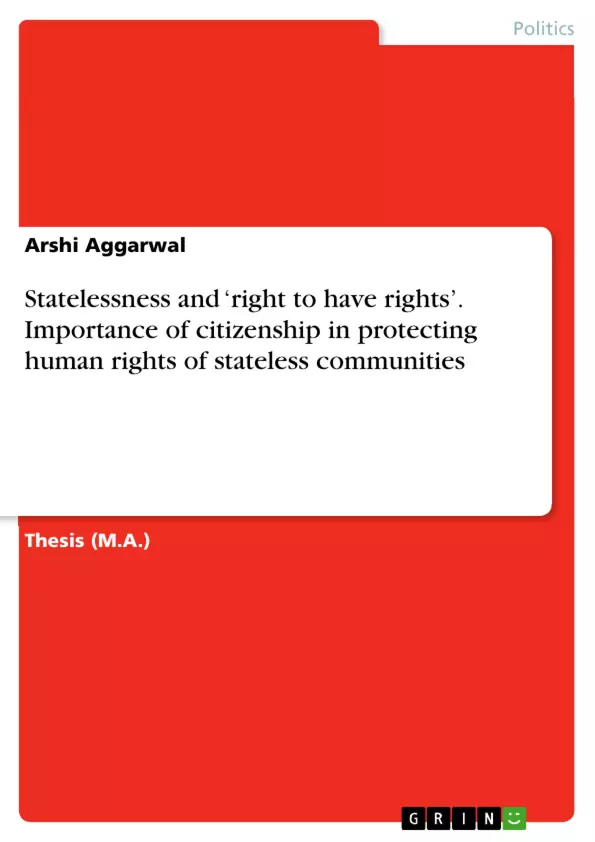A stateless person is an individual ‘who is not considered as a national by any State under the operation of its law’. In other words, a stateless individual is a person who does not legally belong anywhere. No government is responsible for his or her rights, survival or existence. Stateless people are forced to lead an illegal life and are highly vulnerable to increased ostracism, discrimination and insecurity. Where citizenship is the norm, statelessness is an exceptional phenomenon. Some people are stateless because of ethnic persecution; others lost their citizenship during reformation of the state; some simply fell between the cracks of citizenship laws; and others passed on their statelessness to their children. National citizenship provides people with a sense of identity and is a key to full participation in society (UNHCR, 2012:2). Since only ‘citizens’ are allowed an unrestricted right to enter and reside in a country under international law, stateless people are often left without any residence permit and are subject to repeated or continuous detention. The purpose of this project is to analyse and establish the importance of a ‘right to have rights’ or citizenship by examining and evaluating the plight of existing stateless people in Latvia, Estonia and Myanmar. The study explores the human rights conditions created due to statelessness, adequacy of international organisations’ response to such situations and potency of current legal framework for the protection of stateless individuals.
Inhaltsverzeichnis (Table of Contents)
- Part One Why Statelessness
- Chapter 1: Introduction
- Research design and question
- Defining concepts
- Relevance
- Chapter 2: Statelessness and Right to have Rights
- Human rights with or without citizenship
- Problematising statelessness
- Causes of statelessness
- Chapter 3: Existing International Legal Framework
- Part Two Case Studies and Analyses
- Chapter 4: Case Studies
- Rohingyas in Myanmar
- History and political context
- The humanitarian crisis
- International organisations' response
- Russian-speaking Minority in Latvia and Estonia
- History and political context
- The humanitarian crisis
- International organisations' response
- Chapter 5: Against Statelessness: The Argument for ‘Right to Have Rights'
- Answer to research questions
- Policy and theoretical implications
- Limitations and future recommendations
Zielsetzung und Themenschwerpunkte (Objectives and Key Themes)
This dissertation aims to explore the complexities of statelessness and its impact on human rights, arguing for the importance of citizenship in protecting the rights of stateless individuals. The author investigates the legal and political frameworks surrounding statelessness, analyzing the causes and consequences of this phenomenon.
- The relationship between citizenship and human rights
- The challenges faced by stateless individuals in accessing basic rights
- The impact of statelessness on social cohesion and stability
- The role of international law and organizations in addressing statelessness
- The argument for a "right to have rights" as a fundamental human right
Zusammenfassung der Kapitel (Chapter Summaries)
The first chapter introduces the research question and defines key concepts like statelessness, human rights, and citizenship. It highlights the relevance of the study by outlining the challenges and vulnerabilities faced by stateless individuals. Chapter 2 delves into the intricate relationship between human rights and citizenship, exploring how statelessness undermines the enjoyment of fundamental rights. It examines the causes of statelessness, including ethnic persecution, state reformation, and citizenship law loopholes. Chapter 3 analyzes the existing international legal framework for statelessness, highlighting relevant conventions and treaties that address the issue. Chapter 4 presents two case studies: the Rohingyas in Myanmar and the Russian-speaking minority in Latvia and Estonia. These case studies provide insights into the diverse realities and challenges of statelessness in different contexts. Finally, Chapter 5 presents the author's arguments and policy recommendations, advocating for a "right to have rights" as a fundamental human right to address the systemic injustices faced by stateless individuals. The chapter also discusses the limitations of the study and suggests areas for further research.
Schlüsselwörter (Keywords)
The primary keywords and focus topics of this dissertation include statelessness, human rights, citizenship, international law, humanitarian crisis, case studies, policy recommendations, "right to have rights," and international organizations. These terms encapsulate the core concepts and themes explored throughout the research.
Frequently Asked Questions
What is the definition of a stateless person?
A stateless person is someone who is not considered a national by any state under the operation of its law, meaning they legally do not belong anywhere.
What does the "right to have rights" mean?
Coined by Hannah Arendt, it refers to the idea that citizenship is the fundamental right that enables an individual to claim all other human rights; without it, one is often left without legal protection.
Which stateless communities are examined in this study?
The study focuses on the Rohingyas in Myanmar and the Russian-speaking minorities in Latvia and Estonia.
What are the main causes of statelessness?
Statelessness can be caused by ethnic persecution, state reformation (e.g., the collapse of the Soviet Union), or gaps and conflicts in citizenship laws.
How does statelessness impact human rights?
Stateless individuals often face discrimination, lack of access to education and healthcare, no right to travel legally, and are frequently subject to arbitrary detention.
- Citation du texte
- Arshi Aggarwal (Auteur), 2014, Statelessness and ‘right to have rights’. Importance of citizenship in protecting human rights of stateless communities, Munich, GRIN Verlag, https://www.grin.com/document/286323



